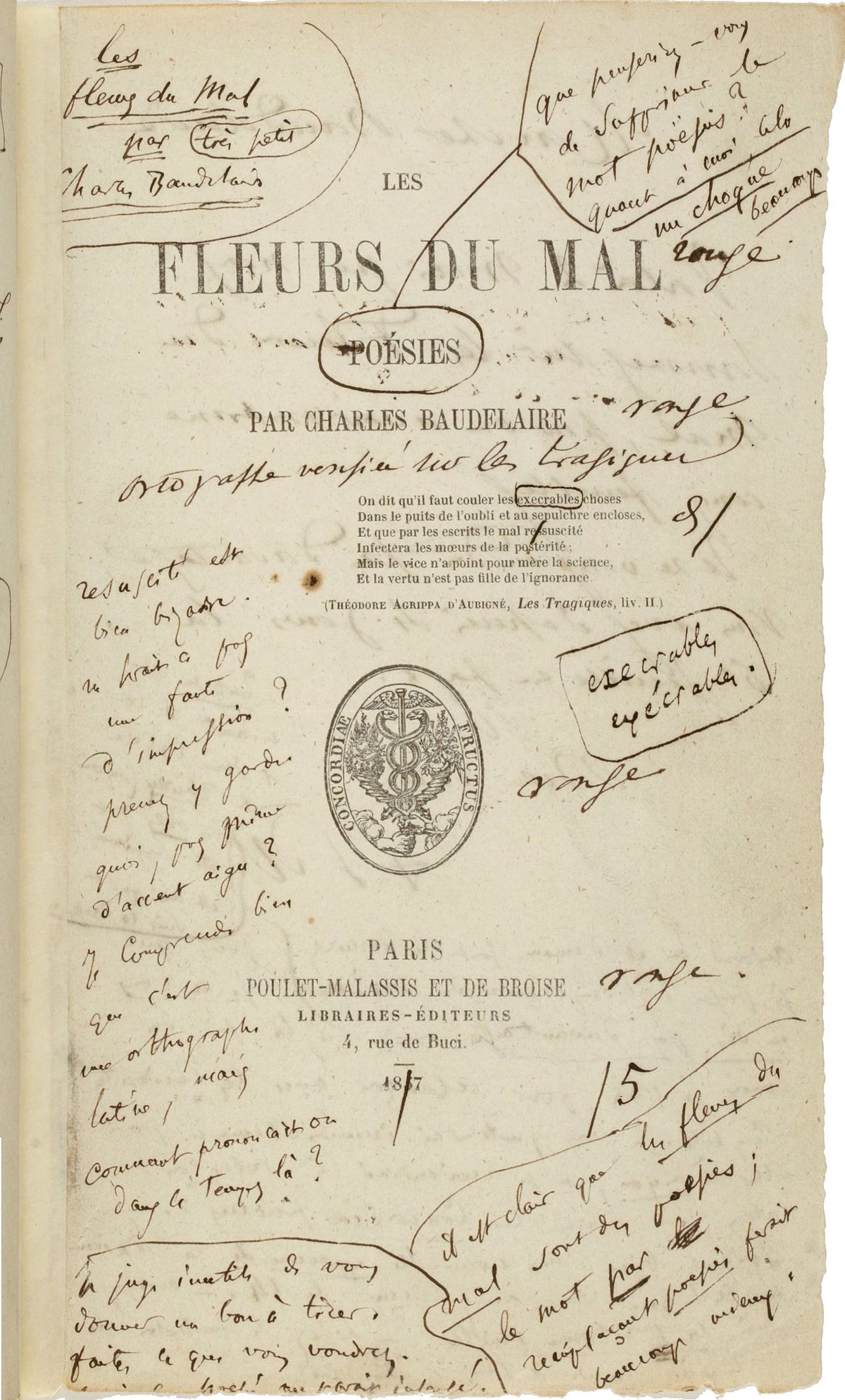| Ïðèîáðåñòè Êóðñ Çíàòîê |
 |
007 Livre Charles Baudelaire Les Fleurs du Mal 1868 |
| TABLEAUX PARISIENS |
|
CXXVII LE CRÉPUSCULE DU MATIN La diane chantait dans les cours des casernes, Et le vent du matin soufflait sur les lanternes. C’était l’heure où l’essaim des rêves malfaisants Tord sur leurs oreillers les bruns adolescents ; Où, comme un œil sanglant qui palpite et qui bouge, La lampe sur le jour fait une tache rouge ; Où l’âme, sous le poids du corps revêche et lourd, Imite les combats de la lampe et du jour. Comme un visage en pleurs que les brises essuient, L’air est plein du frisson des choses qui s’enfuient, Et l’homme est las d’écrire et la femme d’aimer. Les maisons çà et là commençaient à fumer. Les femmes de plaisir, la paupière livide, Bouche ouverte, dormaient de leur sommeil stupide ; Les pauvresses, traînant leurs seins maigres et froids, Soufflaient sur leurs tisons et soufflaient sur leurs doigts. C’était l’heure où parmi le froid et la lésine S’aggravent les douleurs des femmes en gésine ; Comme un sanglot coupé par un sang écumeux Le chant du coq au loin déchirait l’air brumeux ; Une mer de brouillards baignait les édifices, Et les agonisants dans le fond des hospices Poussaient leur dernier râle en hoquets inégaux. Les débauchés rentraient, brisés par leurs travaux. L’aurore grelottante en robe rose et verte S’avançait lentement sur la Seine déserte, Et le sombre Paris, en se frottant les yeux, Empoignait ses outils, vieillard laborieux. |
|
Le Crépuscule du matin La diane chantait dans les cours des casernes, Et le vent du matin soufflait sur les lanternes. C’était l’heure où l’essaim des rêves malfaisants Tord sur leurs oreillers les bruns adolescents ; Où, comme un oeil sanglant qui palpite et qui bouge, La lampe sur le jour fait une tache rouge ; Où l’âme, sous le poids du corps revêche et lourd, Imite les combats de la lampe et du jour. Comme un visage en pleurs que les brises essuient, L’air est plein du frisson des choses qui s’enfuient, Et l’homme est las d’écrire et la femme d’aimer. Les maisons çà et là commençaient à fumer. Les femmes de plaisir, la paupière livide, Bouche ouverte, dormaient de leur sommeil stupide ; Les pauvresses, traînant leurs seins maigres et froids, Soufflaient sur leurs tisons et soufflaient sur leurs doigts. C’était l’heure où parmi le froid et la lésine S’aggravent les douleurs des femmes en gésine ; Comme un sanglot coupé par un sang écumeux Le chant du coq au loin déchirait l’air brumeux Une mer de brouillards baignait les édifices, Et les agonisants dans le fond des hospices Poussaient leur dernier râle en hoquets inégaux. Les débauchés rentraient, brisés par leurs travaux. L’aurore grelottante en robe rose et verte S’avançait lentement sur la Seine déserte, Et le sombre Paris, en se frottant les yeux Empoignait ses outils, vieillard laborieux. |
|
Dawn They were sounding reveille in the barracks’ yards, And the morning wind was blowing on the lanterns. It was the hour when swarms of harmful dreams Make the sun-tanned adolescents toss in their beds ; When, like a bloody eye that twitches and rolls, The lamp makes a red splash against the light of day ; When the soul within the heavy, fretful body Imitates the struggle of the lamp and the sun. Like a tear-stained face being dried by the breeze, The air is full of the shudders of things that flee, And man is tired of writing and woman of making love. Here and there the houses were beginning to smoke. The ladies of pleasure, with eyelids yellow-green And mouths open, were sleeping their stupefied sleep ; The beggar-women, their breasts hanging thin and cold, Were blowing on their fires, blowing on their fingers. It was the hour when amid poverty and cold The pains of women in labor grow more cruel ; The cock’s crow in the distance tore the foggy air Like a sob stifled by a bloody froth ; The buildings were enveloped in a sea of mist, And in the charity-wards, the dying Hiccupped their death-sobs at uneven intervals. The rakes were going home, exhausted by their work. The dawn, shivering in her green and rose garment, Was moving slowly along the deserted Seine, And somber Paris, the industrious old man, Was rubbing his eyes and gathering up his tools. – William Aggeler, 1954 Morning Twilight Reveille in the barracks and the camps. The wind of morning blew upon the lamps. It was the hour when evil dreams in swarms On pillows twist brown, adolescent forms : When like a bleeding eye that’s twitched with pain Each lantern smudged the day with crimson stain : The soul, against its body’s weight of brawn, Lay struggling, like the lanterns with the dawn : Like a sad face whose tears the breezes dry The air grew tremulous with things that fly, And women tired of love, and men of writing. The chimneys, here and there, showed fires were lighting. Women of pleasure, slumber to be-slut, Lay open-mouthed with livid eyelids shut. Dangling thin dugs, cold pauper-women blew Upon the embers and their fingers too. It was the hour when, what with cold and squalor, Women in labour aggravate their dolour, And like a sob, choked short with bloody froth, The cock-crow tore the foggy air as cloth. Like seas the mists round every building poured While agonising patients in the ward, In broken hiccoughs, rattled out their lives : And worn-out rakes reeled homeward to their wives. Aurora, in a shift of rose and green, Came shivering down the Seine’s deserted scene And Paris, as he rubbed his eyes, began To sort his tools, laborious old man. – Roy Campbell, 1952 |
|
Charles Baudelaire Les Fleurs du Mal |
